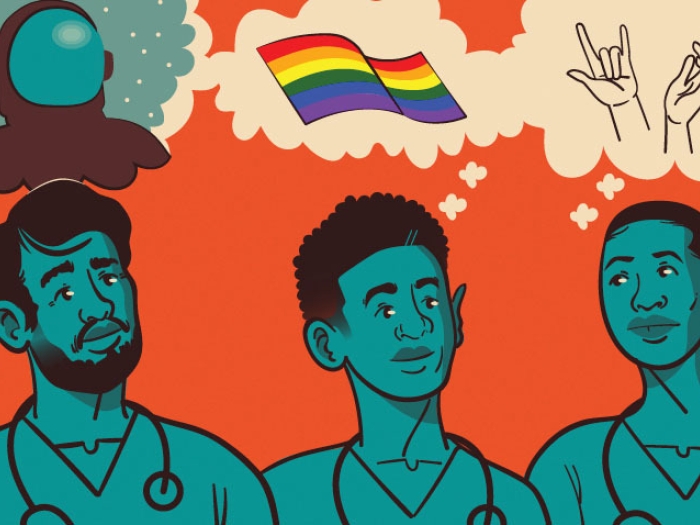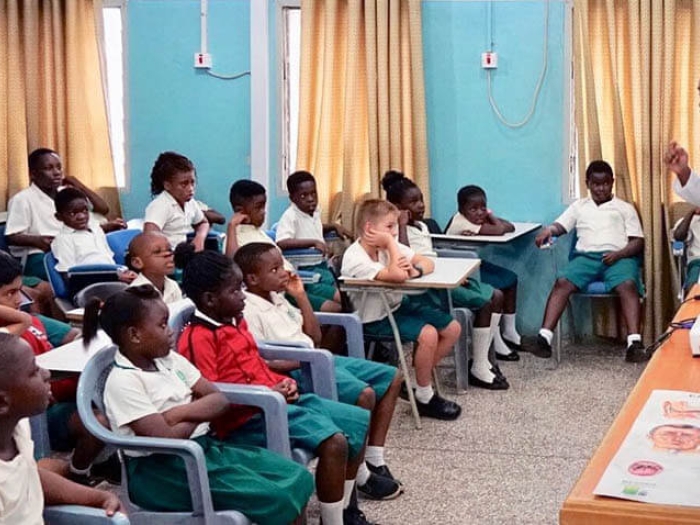As the COVID-19 pandemic continues, changes to the residency application process may tempt applicants to overschedule interviews. Michigan Medicine physicians modeled the potential consequences of over-interviewing.
8:54 AM
Author |

The COVID-19 pandemic is still here, and as a result, residency programs across the United States will have to readjust their interview processes, substituting in-person meetings for virtual ones instead.
This only adds to the uncertainty that many medical students and other key stakeholders already have about the 2021 residency application cycle, notes Helen Kang Morgan, M.D., associate professor of obstetrics and gynecology and learning health sciences at the University of Michigan Medical School. Morgan is also a co-investigator for the Association of Professors of Gynecology and Obstetrics (APGO) American Medical Association Reimaging Residency Grant, "Right Resident, Right Program, Ready Day One."
"Medical students, medical schools and residency programs have already had to deal with cancelled clinical electives, delayed or cancelled United States Medical Licensing Exams (USMLE), significant limitations on visiting student electives and sub-internship rotations, as well as changes to the Electronic Residency Application Service (ERAS) timelines," says Morgan. "The new virtual interview process is just another item on an already-existing list."
Due to these disruptions, both applicants and residency programs may opt to increase their residency interview numbers in the upcoming application cycle.
MORE FROM THE LAB: Subscribe to our weekly newsletter
"It's important to note that applicants will no longer be limited by travel and cost deterrents," says Morgan. "And residency programs will now have the ability to schedule interviews throughout multiple days and during non-business hours. In the past, they were bound to more traditional schedules, with each applicants' interview schedule taking place on a single day."
Morgan adds that without an in-person component, many applicants and programs alike will now look to increase their interview numbers to ensure that they find the right match.
SEE ALSO: Keeping Our Patients Safe During COVID-19
"Historically, traditional interview day experiences have weighed heavily on both parties when determining mutual compatibility," says Morgan. "This will no longer be a factor."
However, this inflation may pose some risks for applicants, as the number of applications per applicant have significantly risen.
"In certain specialty areas like OBGYN, the mean number of applications per applicant has risen from 28 in 2010 to 66 in 2019," says Morgan. "This, in turn, has led to a Pandora's box of consequences, including lowered abilities for residency programs to perform more holistic reviews of candidates versus heavily relying on metrics like USMLE scores."
Morgan points out that this growing ratio also leads to a "disproportionate percentage of interview offers going to a small percentage of applicants."
These notions led Morgan and the APGO grant team to conduct a study to survey OBGYN residency applicants to determine best application practices. They also sought to model potential consequences in the 2021 residency application cycle with virtual interviews. Their work was recently published in the Journal of Surgical Education.
"We sent an anonymous survey to all OBGYN applicants registered through the ERAS in February 2020 and asked them to share some key information, including their demographics and the number of interview offers they received and completed," says Morgan.
When reviewing their data, the team paid close attention to whether or not the applicants were able to schedule an uncapped number of interviews versus adhering to a scheduling cap of just 12 interviews. In addition, they noted any differences in applicant responses when residency programs kept their number of interview offers unchanged versus increasing them by 20%.
SEE ALSO: Seeking Medical Care During COVID-19
The research team then divided candidate responses into groups depending on the number of interviews they were offered.
"We were able to find that in the 2020 residency application cycle, applicants who received a large number of interview offers were already completing more interviews than needed," notes Morgan. "This means that in models where applicants are uncapped in the number of interviews that they can complete, nearly half of applicants could receive an alarmingly low number of interview offers."
Morgan also says that this work highlights how current inefficiencies may lead to negative consequences with virtual interviews. And she stresses that equitable solutions like such interview caps and preference signaling systems need to be considered.
"It is important to model these possibilities early in the 2021 application cycle in order to inform conversations both locally, with individual applicant counseling, and nationally, for specialty-specific and large medical education stakeholder bodies," says Morgan.
"The burden of responsibility in implementing and enforcing interview limitation guidelines needs to be shared between specialty societies, medical schools, national organizations and applicants themselves. Data from this work can inform conversations for the short-term, as well as longer-term discussions about how to meaningfully improve the application processes for the future."
Paper cited: "The Case for Capping Residency Interviews," Journal of Surgical Education. DOI: 10.1016/j.jsurg.2020.08.033.
Like Podcasts? Add the Michigan Medicine News Break on iTunes or anywhere you listen to podcasts.

Explore a variety of healthcare news & stories by visiting the Health Lab home page for more articles.

Department of Communication at Michigan Medicine
Want top health & research news weekly? Sign up for Health Lab’s newsletters today!





